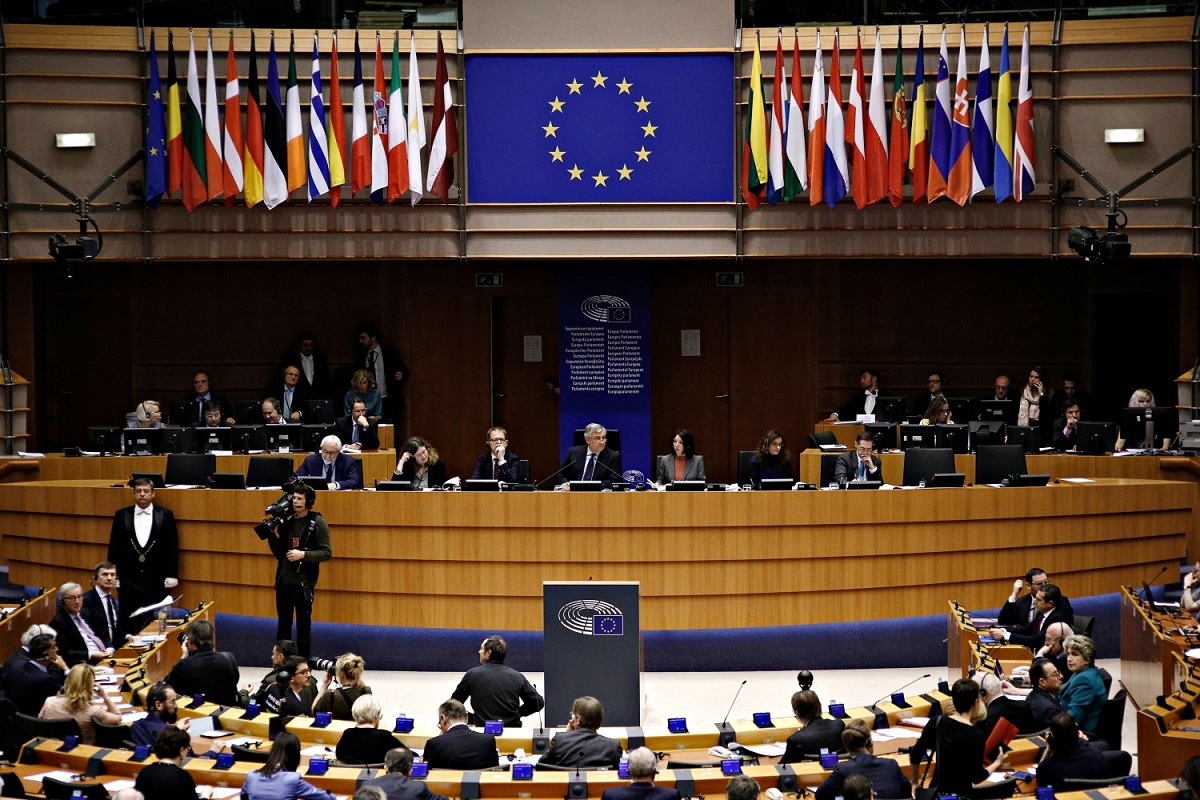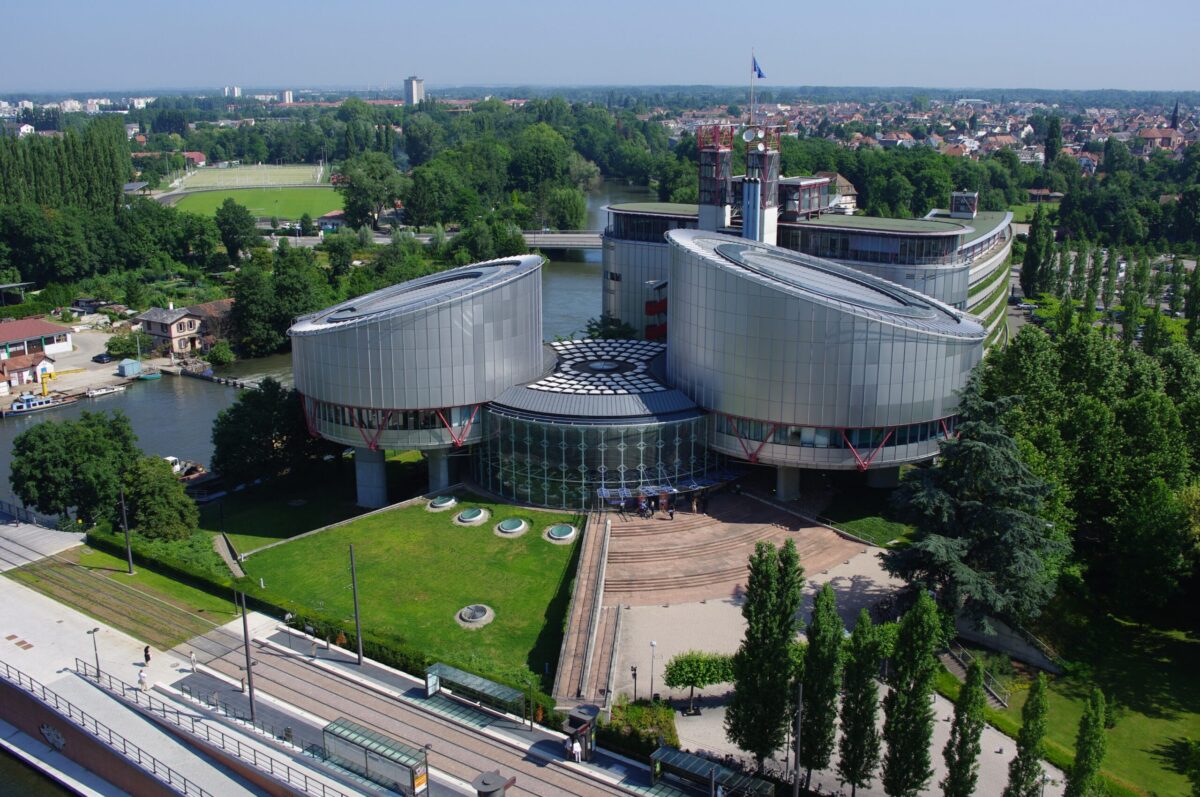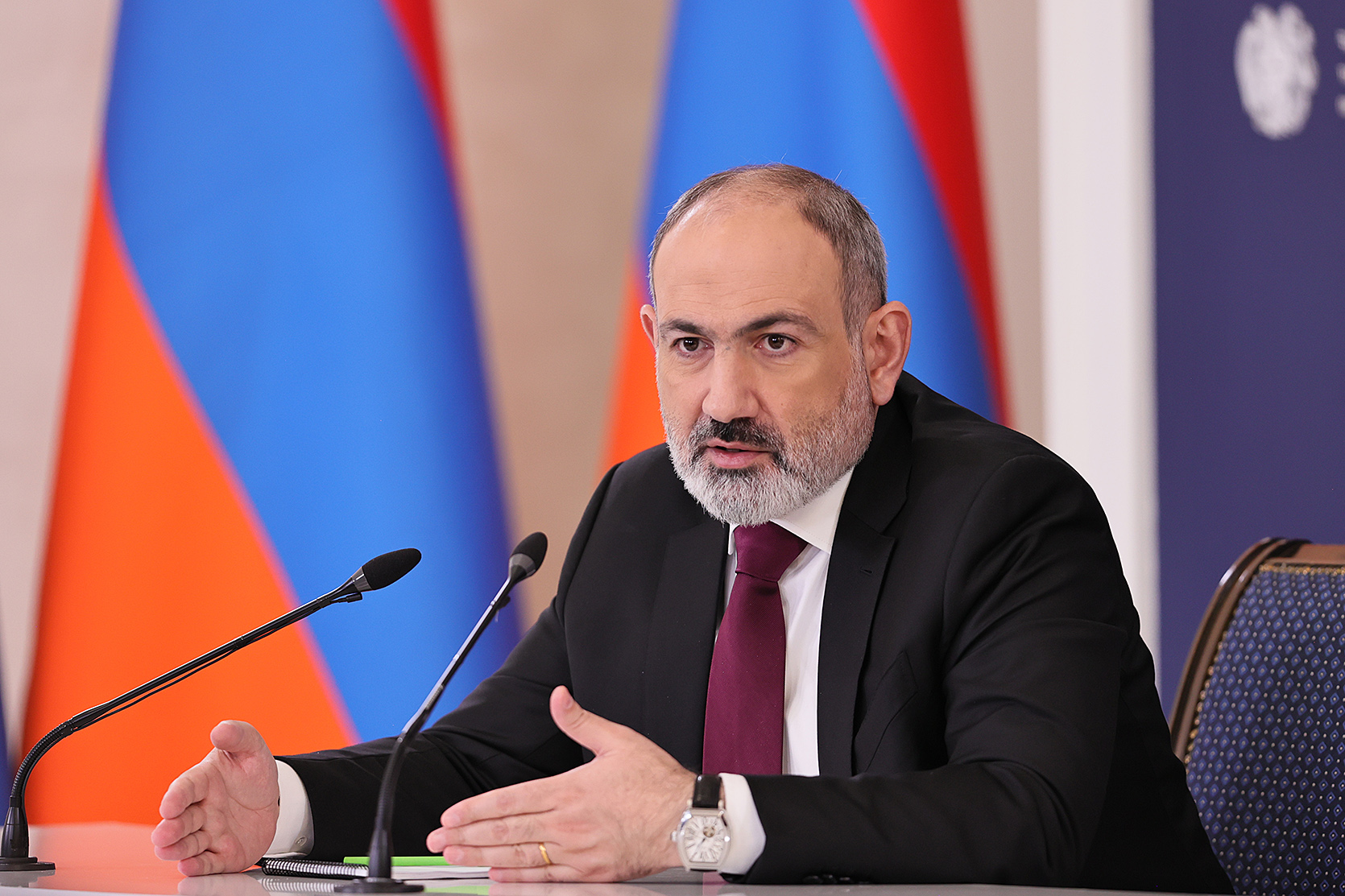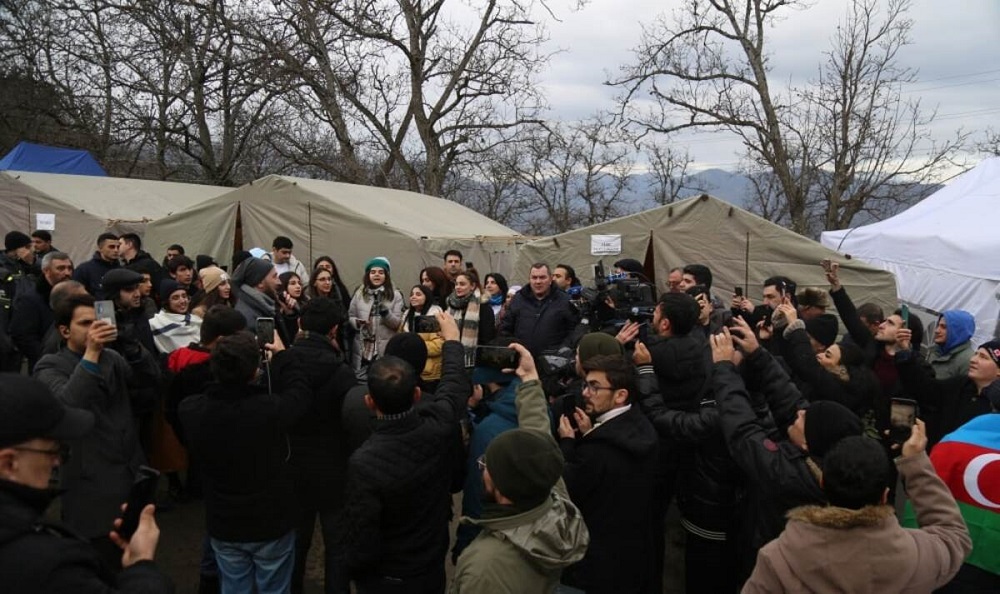“NK Armenians have the right to self-determination” – Ruben Vardanyan in an interview with BBC
BBC interview with Ruben Vardanyan
The state minister of Nagorno-Karabkh discussed the situation in the unrecognized republic on HardTalk, as well as his vision of the future fate of the Armenians living there.
- Thousands rally in NK demanding the Lachin corridor be opened
- What is happening in Nagorno-Karabakh? Personal Stories
- “We are all soldiers in defense of the motherland” – a businessman who became a state minister
Steven Sackur: Mr. Vardanyan, the HardTalk audience probably doesn’t know much about Nagorno-Karabakh, but you are the Minister of State for a small area with a population of 120,000, and right now you are in a state of acute crisis because your overland road to Armenia is blocked. What is the current situation for the inhabitants of your territory?
Ruben Vardanyan: First of all, I would like to thank you for this interview. It is very important that the world learn about what is happening in a blockaded country, where 120,000 people living in their homeland for thousands of years have been fighting for their independence for the last 35 years.
Since December 12, Azerbaijani “eco-activists” have blocked the road and, with the support of Azerbaijan, claim that they now control it. At present we receive nothing but the help of the Red Cross and Russian peacekeepers. We have 30 ,000 children here, it is winter now, electricity is limited, there is practically no gas. Without the help of the Red Cross and Russian peacekeepers, food, medicines and gasoline do not enter our territory.
Steven Sackur: So the Red Cross is making sure that some medicines are being delivered, but I noticed that you have implemented a coupon distribution system that provides granulated sugar, pasta, rice, vegetable oil. However, the impression is that if this continues, your territory will not be able to hold out for long, right? People will suffer.
Ruben Vardanyan: First of all, the Red Cross only has one or two trucks. They or the Russian peacekeepers can bring a very limited amount of medicines or food. Then, you have little idea how strong [in spirit] the Armenians of Artsakh are. We have been living here for thousands of years and are very determined to stay in our homeland. As I said, it’s been 35 years since this struggle began, and we defend our territory and believe in our values. Despite all the difficulties that we face, I believe that the people will stand strong and will be faithful to their homeland.
Steven Sackur: You just called your territory Artsakh – I should clarify that while you call it Artsakh, the Azerbaijani government as well as the international community call it Nagorno-Karabakh, so I just want to clarify that. What confuses me most of all is that you have about 2,000 Russian peacekeepers on your territory. So why don’t they open the road so that supplies reach their destination?
Ruben Vardanyan: Before answering this question, I want to say that if you look at the history textbooks of the Soviet Republic of Azerbaijan in the period of the 1980s, the Artsakh is mentioned as an Armenian territory. I am not saying anything new, it was already in Soviet times in Azerbaijani school history textbooks.
Now let’s get back to your question.
People need to understand that there are only 2,000 peacekeepers and they have a very limited mandate to use weapons, and the road was blocked by “eco-activists”, formally civilians. No illusions – the number of soldiers is very small, they only have light weapons and they have no right to shoot. That is why, in the case of any peacekeepers, it is always very difficult to intervene between the two sides if the conflict continues.
Stephen Sackur – But it’s true, Mr. Vardanyan, that Vladimir Putin has much more serious problems now. The invasion of Ukraine has led to a war that is draining Moscow’s resources, and the last thing Putin wants is to get involved in the conflict in Nagorno-Karabakh. That is the truth. It makes you a lot more vulnerable, doesn’t it? Because Russia’s support is simply not visible.
Ruben Vardanyan – I don’t know what is happening as fa as Russian decision-making, but we have a limitation in the form of a document signed by Azerbaijan, Armenia and Russia on November 9, 2020, by which the number of soldiers was limited by Azerbaijan. So I don’t know what you are talking about. They sent it, they didn’t send it … We follow the document we signed, which today Azerbaijan is completely violating. Because they guaranteed the Armenians living in Artsakh an open road without any control, and now they are completely violating this.
Steven Sackur – Yes, I understand that there was a misunderstanding that affected the government of Armenia, the government of Azerbaijan. But what is interesting to me is that the government of Armenia, headed by Prime Minister Nikol Pashinyan, is now harshly criticizing Moscow, arguing that Russian peacekeepers are not doing their job. But it is interesting that you are much less critical of Moscow. Why?
Ruben Vardanyan – You know, I advise you to come here and you will understand how important it is when you are surrounded by a state of 10 million people, which has a lot of money, a lot of weapons, and we have only 120,000 people with 30,000 children who need to be protected, and we have 2,000 Russian soldiers. I want to ask you this question: are you ready to scold those people who are with you in this situation?
Steven Sackur – Yes, I’m here in London, you are in Nagorno-Karabakh. This is your reality that you have to deal with. And now it seems that not only the Russians are not helping you, but your relations with Armenia and, in particular, with Prime Minister Pashinyan are getting worse. It looks like the government in Yerevan doesn’t have a working relationship with you.
Ruben Vardanyan – I don’t know about this information and, by the way, the number one official in our country, the President, is always in contact with the Prime Minister. So I don’t know what you’re talking about, and it’s a speculation that I don’t think it makes sense to touch on in our conversation.
Steven Sackur – I think it’s important to consider your past and why you are in Nagorno-Karabakh today. You are a very wealthy person, having earned at least a billion dollars, thanks to a business career in Moscow, which coincided with the rise of Vladimir Putin. It’s clear from this that the two of you are quite close. Why did you decide last year to renounce your Russian citizenship, which requires special permission from Putin, and why did you leave Russia and decide to live in Nagorno-Karabakh? Why did you do it?
Ruben Vardanyan – I started my business in 1991 with $35,000 from American investors, building the best investment bank in the region and bringing many investors and major companies to Russia. I did business in England, in the United States. I am a member of the boards of directors of various companies in thirty countries, I have carried out charitable and social projects. Therefore I think that your conclusion about my affinity with Vladimir Putin is incorrect, because I have worked with many people in power or working in the private sector in many different countries, and here is why …
Steven Sackur – You know that the Organized Crime and Corruption Reporting Project (OCCRP) and Navalny’s Anti-Corruption Foundation have both accused you of being in questionable business in the past. You have never been charged, but there are allegations that you were part of the oligarchic system controlled by Vladimir Putin, and this partly explains your wealth.
Ruben Vardanyan – Look, there was this publication four years ago, and for four years I stayed and held positions in many international organizations, which confirms that people who know the truth, people who know me personally understand what all these unsubstantiated statements mean. Because there has never been any legal case in any country.
There are endless accusations about King Charles, about George Clooney and about my colleagues and friends who have worked with me on various projects, such as the Prime Minister of Singapore Lee Kuan Yew and many others whom I had the honor to know and work with.
So with all due respect to journalists, I must say that these statements were simply published without any evidence. And secondly, the financial institution that I ran at the time had a trillion dollar turnover with hundreds of thousands of customers, and blaming Ruben Vardanyan for doing something is like blaming J.P. Morgan or City Bank. I think this is actually manipulation and you are repeating this information again.
Steven Sackur – I’m just talking about what I’ve written, and of course you can dispute what I’ve said. But the truth is that Azerbaijan says that you, I quote here political scientist Elkhan Shahinoglu from Baku, he says that Ruben Vardanyan is Moscow’s man in Karabakh, and that the president is preparing for you to take full responsibility for Nagorno-Karabakh. Is this your intention?
Ruben Vardanyan – You know, I thought that our conversation would be about human rights, the current situation and this catastrophe. And if you continue, citing all these speculations, especially those produced by Azerbaijan, we can talk endlessly. I prefer to talk about how 120,000 people survive this terrible period and under pressure from the political side or “eco-activists”. By the way, I recommend that you check how many environmental protests there have been in Azerbaijan over the past thirty years and how many times the authoritarian regime of Aliyev allowed not just the Armenians, but the Azerbaijanis to say any contrary word against him. We’re talking about something that really surprises me. You do not touch the essence of what is happening here now and how Azerbaijan is behaving. By the way, today the European Parliament…
Steven Sackur – I’m more than interested in talking about what’s going on, but what’s going on is clearly part of the bigger picture. The bigger picture is that the conflict between Armenia and Azerbaijan has been going on in this region for many decades. What we saw in 2020 is that the Azerbaijani troops won a big victory, and you lost more than two thirds of the territory that you controlled until 2020. Now you control a tiny enclave that is isolated by an economic blockade, and it seems to me that your only realistic option is either to make a political deal with Azerbaijan, or the people, the Armenian community of Nagorno-Karabakh, will decide that the situation is no longer stable and leave this territory. So what will happen? Political deal or outcome?
Ruben Vardanyan – Let me finish first. The European Parliament a few days ago approved a resolution with a tough message to President Aliyev, demanding the road be unblocked. Not only Russia, but also France, the European Parliament, the United States are surprisingly unanimous on this issue, which is actually something very special, because we all know what the relationship is today between major European countries and Russia. Secondly…
Steven Sackur – Mr. Vardanyan, even if the blockade is lifted, my question remains: how can the community of Nagorno-Karabakh be viable in the long term? Even the Armenian government says that this is no longer a territorial issue, they no longer claim to turn Nagorno-Karabakh into an independent state or part of Armenia. They say in Yerevan that this is just a matter of rights, a matter of contractual guarantees of security and human rights for the Armenian community in your territory. Everything indicates that in the long run you will be part of the sovereign Azerbaijani state. Do you accept it?
Ruben Vardanyan – Back in Soviet times, in 1988, the people of Artsakh said that they would never be part of Azerbaijan. They are fighting for their freedom and have taken all the necessary legal steps. And today we turn to the world with a very simple question: do we have the right to self-determination in a state that violates all human rights in relation to its own people? How can we live in a country where out of 104 years of existence of the Republic of Azerbaijan for 44 years (first as part of the Soviet Union, then as an independent republic), one family rules the country where an Azerbaijani has no rights, not to mention the Armenians?
With the way they treat us, how do you imagine the possibility for an ethnic minority to have rights? For us it is not a matter of whether we want to or not; we do not see any possibility. By the way, in this blockade, the last example was very revealing. Children who were separated from their families and remained in Armenia, unable to return, six weeks later, with the mediation of Russian peacekeepers, tried to return to Artsakh,and the Azerbaijanis stopped them, checked them, and subjected them to psychological pressure. Xenophobia is so high, for this reason…
Steven Sackur – I want to make this clear, sorry to interrupt, but you say that you are and of course many people sincerely say that right now you are in charge in Nagorno-Karabakh. Do you say that you are in no way ready to have any kind of negotiations or dialogue with President Aliyev and the government of Azerbaijan?
Ruben Vardanyan – No, we are ready to negotiate if Azerbaijan understands that negotiations are for both sides. Because what we have been saying since the first day of the demand for independence — we understand and accept that we will live side by side, but we will be a separate territory, a separate state, there will be separate rules and laws, since we are a democratic country, we do not see ourselves as part of Azerbaijan, but we respect that we will live in the same region, and we need to find a way, despite all the difficulties, to find a solution that will be acceptable to both sides, because …
Steven Sackur – So I understand that you fundamentally disagree with the government in Yerevan, which says that now for your people it’s just a matter of negotiating the right deal, frankly, within Azerbaijan. They say it’s a matter of rights, that human rights and the right to security for your people be guaranteed, but they say it’s no longer a matter of territory or sovereignty.
Ruben Vardanyan – First of all, the government of Armenia, the leader of Armenia said that whatever decision the leadership of Artsakh makes, they will follow our choice. We have already received clear messages from France, the USA, Russia: they do not even consider this issue closed. Despite all the rhetoric of Azerbaijan, thanks to the international community, discussions in the UN and the UN Security Council, it became clear that everything is not over, because we have the right to self-determination, because ethnic cleansing is prohibited by the UN Charter.
Despite all Azerbaijan’s speculations, the story is not over. We believe that we have the right to independence, we have the right to live in our own homeland, the majority of people living in Artsakh understand the difficulties we face and they are ready to stay and defend their own home.
Steven Sackur – Yes, you say it’s not over, but Russia is an important factor in all of this. I mean, for decades Armenia has relied on Russian military support. I wonder what lessons you learned from Putin’s invasion of Ukraine? Do you consider this war, first of all, reprehensible and do you see it as a dangerous lesson for Armenia?
Ruben Vardanyan – Look, I am now the state minister of a small republic in which 120,000 people suffer because of the unprecedented actions of the Azerbaijani state. And I am responsible for protecting the children who live here, and I will do whatever is necessary to protect Artsakh.
Steven Sackur – But that’s not the answer at all. I just asked you if you would condemn Putin’s invasion of Ukraine?
Ruben Vardanyan – And I answered you, saying what is necessary to protect my people, because I believe that any answer I make about the position of Russia, France, the United States can damage the ability to receive international support, it would be wrong to comment on it. For this very reason, with all due respect, while regretting what is happening in various conflicts, by the way not only in Ukraine but also in Yemen, in Syria and in many other places in the world, I am currently interested in what what will happen to my people who have been in blockade for more than thirty days without electricity, without gas.
Steven Sackur – The fact is that your words contradict the opinion of the Armenians living in Armenia, because they are very worried about the consequences of Putin’s invasion of Ukraine. I will quote you the words of the head of the Yerevan Center for Political and Economic Strategic Studies, Benyamin Poghosyan, who says: “It is becoming obvious that we can no longer rely on Russia. Even if Russia comes out of the war with Ukraine intact, they may try to include Armenia in a kind of union state with Belarus, and this is not what we want.” Do you want that? Do you think that the fate and future of Armenia are connected with Russia, Putin’s Russia?
Ruben Vardanyan – I don’t want to talk about Armenia, we are a separate country. I’m talking about Artsakh. Artsakh will not be part of Azerbaijan.
Steven Sackur – Are you satisfied with long-term dependence on Vladimir Putin?
Ruben Vardanyan – What do you mean?
Steven Sackur – I think it is quite simple: you say that we are now politically quite far from Yerevan, from the government of Armenia. So your only guarantor, your only hope for salvation is Vladimir Putin.
Ruben Vardanyan – That’s not true. President Macron has clearly stated and is making a lot of efforts to support Artsakh. By the way, the speaker of the French Senate made the same statement. The US Ambassador recently said that they, together with Russia, will try to find a solution to help Artsakh get out of this situation. That’s why you are manipulating a little, because the biggest western countries, like France, the USA, are also sending a clear signal that they are concerned about the events here.
Steven Sackur – You know in Nagorno-Karabakh, in your small community, there are people who believe that your appointment as a state minister has had bad consequences. Bella Lalayan says you’ve only created more problems and compromised their security. Some want you to leave and they want you to leave right now.
Ruben Vardanyan – It’s normal that people have different opinions. I am happy that I am here with the people of Artsakh, every day I walk the streets, I see people who…
Steven Sackur – The fact is that many in Nagorno-Karabakh consider you an outsider. You came from Moscow, you got rich in Russia, you were not born in Nagorno-Karabakh, you were born in Yerevan. Many in Nagorno-Karabakh are wondering if you really represent their interests.
Ruben Vardanyan – About my origin: my grandmother is from Artsakh. Over the past twenty years, I have done about 89 projects in Artsakh, my son served in the army here, my daughter was here, because what you said is just speculation that people invent. Of course, this happens everywhere, and some invent dirty stories regardless of reality. I arrived here on September 2, 2022 and said that I am no different. I did not apply for any position. The President offered me this position, but I am glad to remain here without any position, and I will stay here.
I don’t care if I’m a minister of state or not, I’m here with people who need my help. Not because I am rich, but because we want people outside of Artsakh to realize that Artsakh is the key to the identity of the entire Armenian people, the custodian of the DNA of the Armenian people for thousands of years.
Steven Sackur – Let’s get it straight and recap because we’re running out of time. You will not go anywhere – is that your message?
Ruben Vardanyan – I will stay here with my people, whatever we face we will face together. Yes.
Interview with Ruben Vardanyan BBC
























